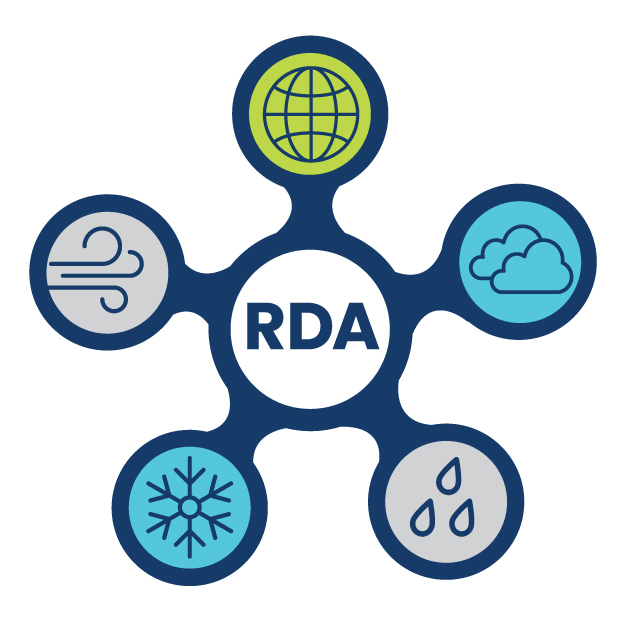
ERA5 monthly mean back extension 1950-1978 (Preliminary version)
d633005
| DOI: 10.5065/JAXB-X906
ECMWF has announced that the Copernicus Climate Change Service (C3S) has begun the release of the ERA5 back extension data covering the period 1950-1978 on the Climate Data Store (CDS).
Although in many other respects the quality of this dataset is quite satisfactory, the current back extension appears to suffer from tropical cyclones that are sometimes unrealistically intense. This is in contrast with the ERA5 product from 1979 onwards (also available from the CDS and RDA ds633.0). For more details see the article, ERA5 back extension 1950-1978 (Preliminary version): tropical cyclones are too intense.
For this reason the current release of the back extension is preliminary.
It is therefore available from separate CDS catalogue entries (hourly, monthly, single level and pressure levels), and this RDA dataset. Around the end of 2021 an updated version of the back extension is to be made available which will be added to the ERA5 catalogue entries that currently reach back to 1979. After an overlap period (the duration of which is not yet decided), the preliminary back extension will be deprecated.
The full back extension preliminary dataset is expected to be made available near the end of 2020/early 2021.
After many years of research and technical preparation, the production of a new ECMWF climate reanalysis to replace ERA-Interim is in progress. ERA5 is the fifth generation of ECMWF atmospheric reanalyses of the global climate, which started with the FGGE reanalyses produced in the 1980s, followed by ERA-15, ERA-40 and most recently ERA-Interim. ERA5 will cover the period January 1950 to near real time.
ERA5 is produced using high-resolution forecasts (HRES) at 31 kilometer resolution (one fourth the spatial resolution of the operational model) and a 62 kilometer resolution ten member 4D-Var ensemble of data assimilation (EDA) in CY41r2 of ECMWF's Integrated Forecast System (IFS) with 137 hybrid sigma-pressure (model) levels in the vertical, up to a top level of 0.01 hPa. Atmospheric data on these levels are interpolated to 37 pressure levels (the same levels as in ERA-Interim). Surface or single level data are also available, containing 2D parameters such as precipitation, 2 meter temperature, top of atmosphere radiation and vertical integrals over the entire atmosphere. The IFS is coupled to a soil model, the parameters of which are also designated as surface parameters, and an ocean wave model. Generally, the data is available at an hourly frequency and consists of analyses and short (12 hour) forecasts, initialized twice daily from analyses at 06 and 18 UTC. Most analyses parameters are also available from the forecasts. There are a number of forecast parameters, e.g. mean rates and accumulations, that are not available from the analyses.
Improvements to ERA5, compared to ERA-Interim, include use of HadISST.2, reprocessed ECMWF climate data records (CDR), and implementation of RTTOV11 radiative transfer. Variational bias corrections have not only been applied to satellite radiances, but also ozone retrievals, aircraft observations, surface pressure, and radiosonde profiles.
Please note: DECS produces a CF 1.6 compliant netCDF-4/HDF5 version of ERA5 for the CISL RDA at NCAR. The netCDF-4/HDF5 version is the de facto RDA ERA5 online data format. The GRIB1 data format is also available online. There is a one-to-one correspondence between the netCDF-4/HDF5 and GRIB1 files, with as much GRIB1 metadata as possible incorporated into the attributes of the netCDF-4/HDF5 counterpart.
| Air Temperature | Albedo | Cloud Frequency | Cloud Liquid Water/Ice |
| Convection | Convergence | Dew Point Temperature | Evaporation |
| Gravity Wave | Heat Flux | Humidity | Ice Extent |
| Incoming Solar Radiation | Longwave Radiation | Outgoing Longwave Radiation | Planetary Boundary Layer Height |
| Precipitation Amount | Runoff | Sea Level Pressure | Sea Surface Temperature |
| Shortwave Radiation | Skin Temperature | Snow | Snow Density |
| Snow Depth | Snow/Ice Temperature | Snow/Ice Temperature | Snow Melt |
| Soil Classification | Soil Moisture/Water Content | Soil Temperature | Surface Pressure |
| Surface Roughness | Surface Winds | Terrain Elevation | Total Precipitable Water |
| Tropospheric Ozone | Upper Air Temperature | Upper Level Winds | Vegetation Cover |
| Vegetation Species | Vertical Wind Velocity/Speed | Vorticity | Water Vapor |
| Wind Stress |
Latitude Range: Southernmost=90S Northernmost=90N Detailed coverage information Detailed coverage information 0.25° x 0.25° from 0E to 359.75E and 90N to 90S (1440 x 721 Longitude/Latitude)
 This work is licensed under a Creative Commons Attribution 4.0 International License.
This work is licensed under a Creative Commons Attribution 4.0 International License.